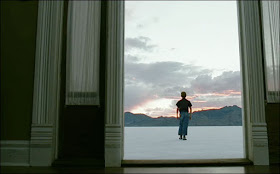
Terrence Malick's The Tree of Life is a many-splendored thing. I've watched it twice and various parts of it have affected me in different ways. It's like holding up a diamond in shifting rays of light. There's much that is opaque and open to various interpretations, which isn't surprising since ambiguity and refusal to talk about the meaning of his films are part of the writer/director's stock-in-trade. But what is obvious is that the dichotomy between grace and nature is the most important theme of the film. The primary protagonist, Jack, sees his mother (Jessica Chastain) as the epitome of the "way of grace" and his father (Brad Pitt) as representing the "way of nature." In many ways they represent the same opposition as the Jim Caviezel and Sean Penn characters in The Thin Red Line.
The nature versus grace theme is spelled out in as clear a way as you'll ever find in a Malick film in this voiceover by the mother.
The nuns taught us there were two ways through life—the way of nature and the way of grace.
You have to choose which one you'll follow.
Grace doesn’t try to please itself.
Accepts being slighted, forgotten, disliked.
Accepts insults and injuries.
Nature only wants to please itself.
Get others to please it too.
Likes to lord it over them.
To have its own way.
It finds reasons to be unhappy when all the world is shining around it.
And love is smiling through all things.
When I first heard that I thought immediately of 1 Corinthians 13. Substitute love for grace and you'll see what I mean. Then recently I came across another likely source of inspiration for the grace/nature trope: The Imitation of Christ. Here are some lines from Book 3, Chapter 54 "On the Opposition between Nature and Grace". . .
Nature indeed is wily and betrays many through its deceits and crafty ways, and has always self as its end.
Nature always looks to its own advantage, considering what gain it can derive from another. But grace is not concerned with its own profit, but with what may benefit others.
Nature is greedy and gladly takes rather than gives, and clings possessively to private possessions. But grace is kind and unselfish, avoids self-interest, is content with little, and rightly judges that it is more blessed to give than to receive.
Grace seeks comfort only in God, finding delight in the Sovereign Good beyond all things visible.
Evidently those nuns that taught the mother were reading Thomas. Later in the movie the nature/grace conflict is internalized within the boy Jack -- who I think is a proxy for the filmmaker -- when he delivers a direct quote from Romans 7: "What I want to do, I can't do, I do what I hate."
The Tree of Life stops short of presenting a clear solution to that dilemma. It's not a "Christian film", it's not a systematic presentation of biblical theology, or the plan of salvation. But then the The Lord of the Rings and the Narnia stories are none of those things either. I'm not saying Terrence Malick is in the same league as Tolkien and Lewis, but through his cinema I catch glimpses of "the Sovereign Good beyond all things visible." And the final beatific ten minutes of The Tree of Life invites me to dare believe in a far country where our divided selves will be united, past present and future reconciled, and everything sad will come untrue.
No comments:
Post a Comment